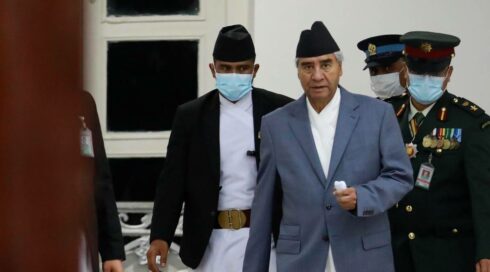The US expects “absolute allies”, but the new polycentric world that is emerging makes room for diversified bilateral relations.
Written by Uriel Araujo, researcher with a focus on international and ethnic conflicts.
An Oxford Analytica March 24 executive summary concluded that Washington’s engagement in South Asia will broaden. This is visible in the recent Assistant Secretary of State Donald Lu meetings with Bangladesh authorities and other high level engagements with Sri Lanka and the Maldives. Another sign of it are the reports that Nepali Prime Minister Sher Bahadur Deuba is expected to visit Washington in mid-July; it would be the first time a Nepali Prime Minister does so in two decades, as there have not really been high-level exchanges between the two states. In fact, Nepalese Foreign Minister Pradeep Gyawali’s trip to Washington in December 2018 was the first foreign minister visit in 17 years. If everything goes according to plan, Deuba will take part in the second Summit for Democracy.
Deuba is certainly well seen in Washington, at least more so than other Nepalese Prime Ministers in the recent past, most of them being from communist parties that favor good relations with Beijing. The United States, anyway, is Nepal’s largest bilateral donor, and the country is interested in attracting American investments.
This year marks the 75th anniversary of US-Nepal diplomatic ties, and last week Uzra Zeya, the American Under Secretary of State, concluded her three-day trip to Nepal, this being the highest official visit since 2012. November last year, US Assistant Secretary of State Donald Lu flew to Kathmandu, and in April a US Congressional delegation also visited it.
All of this signals that the Biden presidency is indeed interested in widening its engagement in the South Asian region. In fact, in December 2018 the US State Department, during the Donald Trump administration, had already announced that Nepal was part of its Indo-Pacific Strategy. At the time, former Foreign Secretary Madhu Raman Acharya stated that it seemed Washington seeks to bring Nepal into its own strategic sphere. She warned that “major powers are trying to induce Nepal in their strategic ambit but we should be careful.” The country is a signatory to the Chinese Belt and Road Initiative.
Biden has therefore signaled his administration intends to maintain Trump’s strategy for Nepal and other South Asian countries.
These nations are currently seeking to increase regional connectivity. For example, the Bay of Bengal Initiative for Multi-Sectoral Technical and Economic Cooperation (BIMSTEC) has been searching for a greater role in the Indo-Pacific. The grouping held its fifth summit on 30 March, and at the time the US issued a diplomatic note protesting Myanmar’s participation in it. India defended the country’s participation arguing that it is part of the Bay Of Bengal Initiative and cooperation needs the presence of all member states to be successful. This is an example of how Washington pressures the countries it engages with into alignment.
Although a small state, Nepal plays an important role in the South Asian Association for Regional Cooperation (SAARC) and the BIMSTEC. Its very geographical position connects major markets.
The problem is that the very notion of the Indo-Pacific Region (IPR), as advanced by Washington, is seen by many observers as a ploy to counter Nepal’s northern neighbor, namely China. Thus, Kathmandu’s involvement in such an initiative could create friction with Beijing, as the US exerts such strong diplomatic pressure on its new partners.
Another example (in the South Pacific) of the US “cold war mentality” is the very manner it reacted to the recent China-Solomon Islands security deal – it even included the threat of invasion. Similarly, New Zealand has been facing some pressure to align with AUKUS. As is the case with other American initiatives, its efforts to broaden its South Asia policy could in fact backfire. In the same way Indonesia and India have their own visions of the IPR, other regional actors too are more interested in diversifying partners and balancing relations than in a new cold war.
The challenge for these nations is to forge partnerships with global powers based on their interests in such a way that they are not forced into alignment with any power, thus maintaining their independent foreign policies. The US expects “absolute allies”, but the new polycentric world that is emerging makes room for diversified bilateral relations – not only in the wider Indo-Pacific area, but globally, as we are beginning to see in Africa, for example. The BRICS grouping recent consensus on expansion is yet another example of this tendency of states employing such forums to coordinate perspectives and to maximize benefits for all involved – bilateral disputes apart.
It remains to be seen whether or not Washington is ready to wisely play a role in this new game – other than aggressively promoting tensions worldwide.






